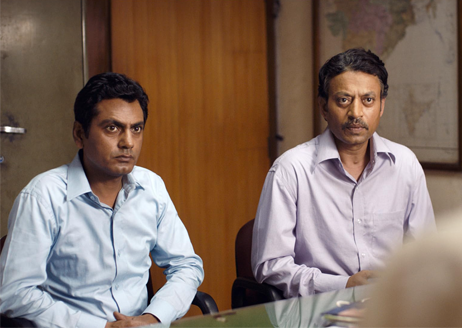
3 minute read
After Beyond the Clouds and Joyland: 7 South Asian Films That See the Margins Clearly
There’s a quiet urgency in films like Beyond the Clouds and Joyland. Both resist melodrama, even as they explore lives shaped by systemic pressure. Majid Majidi’s Beyond the Clouds follows a teenage boy in Mumbai navigating poverty, crime, and fractured family ties. Saim Sadiq’s Joyland, Pakistan’s Oscar submission and Cannes breakout, tells a layered story of gender, tradition, and longing through a Lahore family on the edge of rupture.
What unites these films is not just geography, but gaze. They look closely at those often seen from a distance, women restrained by expectation, men weighed down by economic need, queer individuals negotiating visibility, and young people trying to find space in rigid worlds.
Here are seven more films from India and South Asia that echo those concerns. Quiet in tone, deeply human in focus, they observe more than they instruct, and leave much to sit with.
1. Court
Chaitanya Tamhane | India, 2014
A folk singer is arrested in Mumbai for allegedly inciting a sewage worker’s suicide through his lyrics. What follows is not a courtroom drama in the conventional sense, but a patient dissection of India’s legal machinery, its language, delays, and indifference. Tamhane’s camera is observational, and the performances are understated. It’s a film less about a case than about the system that contains it.
2. Ee.Ma.Yau
Lijo Jose Pellissery | India (Malayalam), 2018
Set in a coastal village in Kerala, this darkly comic and deeply moving film unfolds around a man trying to give his father a dignified funeral. Bureaucracy, family disputes, and absurd mishaps unravel around him. Beneath the farce lies a quiet critique of class, tradition, and masculine pride in mourning. Pellissery’s direction is immersive, often staging long takes with extraordinary precision.
3. Aligarh
Hansal Mehta | India, 2015
Based on the true story of a professor suspended from Aligarh Muslim University after his sexual orientation is exposed, Aligarh is less about scandal than about solitude. Manoj Bajpayee gives a restrained, internal performance as a man whose only crime is his desire for privacy. Mehta directs with restraint, refusing to sensationalize the deeply personal cost of public judgment.
4. The Lunchbox
Ritesh Batra | India, 2013
On its surface, The Lunchbox is a gentle romance born of a mistaken food delivery. But beneath that is a subtle meditation on urban loneliness, routine, and emotional invisibility in a city as crowded as Mumbai. The characters, a widower close to retirement and a neglected housewife, never meet. Yet through notes exchanged via a tiffin carrier, a rare intimacy forms.
5. Pebbles (Koozhangal)
PS Vinothraj | India (Tamil), 2021
Told with almost no dialogue, this minimalist drama follows a father and son walking through arid southern India after the father forcibly removes his wife from her home. Their journey, physical and emotional, becomes a portrait of cruelty, heat, and exhaustion. The film is shot in raw, blistering landscapes, where survival feels as immediate as breath. It was India’s official Oscar entry in 2022.
6. I Am Not a Witch
Rungano Nyoni | Zambia/UK, but notable mention
While not South Asian, this film resonates in tone and subject with Joyland — the story of a young girl accused of witchcraft in rural Zambia, sent to a "witch camp" where she’s tied to a ribbon and told freedom will turn her into a goat. It’s a satire, but delivered with such calm absurdity that it cuts deeper than outrage. A reminder that women’s agency, and how it’s suppressed, is a global conversation.
5. Nasir
Arun Karthick | India (Tamil), 2020
Set over the course of a single day, Nasir quietly follows a Muslim sari salesman in Coimbatore — his work, his home life, his inner world. What begins as a tender, observational portrait slowly gives way to something more ominous. The violence, when it arrives, is off-screen. But the fear and tension leading to it have been accumulating all along. The film captures, with eerie calm, what it means to live as a minority under rising hostility.
A Cinema of Unspoken Things
What connects these films isn’t just their geography or language, but their refusal to sensationalize the very real fragilities they depict. They focus on individuals caught in systems, legal, cultural, and familial, that are often indifferent to individual pain.
Like Beyond the Clouds and Joyland, they deal in ambiguity. But in their quietness, they offer something clear: attention. And sometimes, that’s the first form of justice art can offer.






